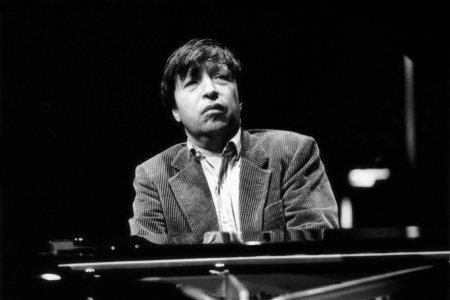You'll have mazurkas coming out your ears by the end of next month. But what mazurkas they'll be! Fever pitch is approaching as the big pianistic guns line up to celebrate Chopin's 200th birthday anniversary on 1 March. The venerated pianists Krystian Zimerman and Maurizio Pollini and esteemed young pretender Yevgeny Sudbin are all to come at the South Bank. Last night at the Barbican, we had the opening salvo from the poet of the piano, Murray Perahia. And as usual with him, this was as much a song as a piano recital, the boyish Perahia ringing out those evergreen melodies like a musical Keats, with an elegance, drama and natural beauty few will ever come close to matching.
To start, however, a masterclass in those other Perahian hallmarks: contrapuntal clarity and structural sculpting, with a cumulatively powerful performance of Bach's manic Sixth Partita. In the stately opening Toccata, a darkly woven fabric, Perahia was already laying out his compellingly personal stall, with a few questioning right-hand curls, slow and searching, followed by long diminuendos and crescendos that seemed to follow some large contoured landscape. Whereas the voicing in the Toccata split in two, in the Allemande one got the sense of one body and two limbs, knocking each other into further curling energy.
Following a Corrente of extreme syncopation, where we were thrillingly close to losing touch of beats completely were it not for Perahia's conducting shoulders, we zipped through an Air full of croaky acciaccaturas, lingered happily on a fantastical Sarabande isle, a rich and creamy take on the opening Toccata, one that Schoenberg might have been proud of, then sped through a tricksy Gavotta to the mad Gigue, which is stuffed full of jumpy antagonisms (soft-loud, detach-hold, relax-attack) in a furious and delightful contrapuntal maze.
Next, a perfectly measured performance of Beethoven's Piano Sonata in E minor, Op 109. No exaggerations, no shocks, just expression, a certain amount of upping the dramatic ante when necessary and a beautiful realisation of the Gesangvoll musical indication, Perahia making the final theme sing first with ripeness, then, the second time upon its miraculous return with humble simplicity.
When the Chopin finally came in the second half, it was not a disappointment. Perahia assumed an operatic role in the Third Ballade in A flat major, turning out the melody, then relishing a bit of theatrical scampering. And he continued to vocalise, in left-hand (in the Étude in E minor, Op 25 No 5) and right, using little finger (in the Étude in A flat major, Op 25 No 1) or thumb. One imagined his little toes being able to belt out a pretty decent top C if need be.
Actually his toes weren't that able at all really. There were moments of muddiness as a result of slack pedalling. The mazurkas in particular are duets for finger and foot; the pedalling is key. So these suffered more than most. Having said this, Perahia has such a keen ear for drama and phrasing that moments of mud were quickly followed by musical treats: a curtailing of a melancholic voice in the Op 50 No 3, the Mazurka in C sharp minor, or a unravelling of magically long threads in the Op 10 No 4, the Étude in C sharp minor.
Then came the nerve-wracking end. Perahia had told me last year how Chopin's Fourth Scherzo in E major still terrifies him and it was up next. Before the Scherzo little smudges and slips had crept into his playing but had barely registered, so little did they matter to the structural integrity of the playing. The Fourth Scherzo was different. Here, virtuosity in colour, pedalling and technique is everything. These qualities need to marry perfectly for success. And despite some passages of sheer joy, his fingers did not sparkle as they once did.
Thankfully, this wasn't the end note. One final pianistic song was unfurled in the shape of Chopin's Nocturne in F major, Op 15 No 1, which saw a rose-like spiralling of melody so freshly sweet one felt Perahia was magicking the onset of Spring.
You will find flashier and moodier Chopin performances in this anniversary year, but none will have Perahia's grace.
- Murray Perahia's concert schedule can be found on his website.
- The Barbican's Great Performers' series continues on March 2 and 3 with Lorin Maazel and the Vienna Philharmonic. Check out what's on in the Barbican Centre this season
- Krystian Zimerman plays Chopin at the Royal Festival Hall next Monday, Pollini on March 1 and rising star Yevgeny Sudbin at the Queen Elizabeth Hall on March 25.













Add comment